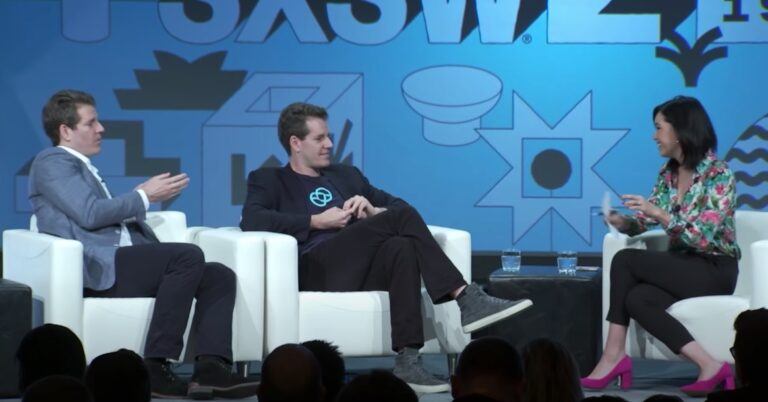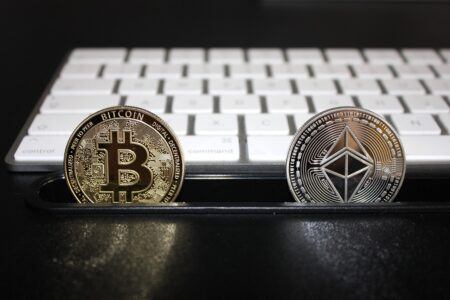On Thursday (August 27), the Winklevoss twins, explained why they believe that Bitcoin is “undervalued by a multiple of 45”, which means that its price could reach over $500,000.
Tyler and Cameron Winklevoss are the co-founders of Gemini Trust Company, LLC (which operates the Gemini digital asset exchange) as well as family office Winklevoss Capital Management, LLC.
On Thursday, Gemini CEO Tyler Winklevoss published a blog post titled “The Case for $500K Bitcoin,” in which he tried to make the case that “Bitcoin is ultimately the only long-term protection against inflation” and to explain why he and his brother Cameron believe that the price of Bitcoin could reach $500,000.
Tyler started by pointing out by explaining why he feels that the U.S. dollar is not a good store of value despite it being the world’s primary reserve currency for “the last 75 years.”
He says that the world was “drowning in debt” even before we had the COVID-19 pandemic:
“… unfavorable tectonic demographic shifts have been well underway in many developed countries for decades.
“Falling birth rates have inverted population pyramids, which means that shrinking younger generations will increasingly be unable to shoulder the growing debt burdens (e.g., healthcare, pension, social security, etc.) that have been handed down to them by the much larger, older generations.”
Next, he says that governments can only reduce their debt in three ways:
“They can choose to (i) not pay some portion of their debt (i.e, “hard default”), (ii) adopt austerity measures in hopes of running a budget surplus, or (iii) reduce the value of the debt they owe through inflation (i.e., “soft default”).”
He then says that of these three strategies, the one that is likely to be adopted by most governments (including the U.S. government”) is soft default, which he explains as follows:
“In this scheme, a government intentionally devalues its currency in order to erode the real value of the debt that it owes. Lenders still get paid the same amount of dollars that they are entitled to, however, because of inflation, such dollars are now worth less in real terms.”
Tyler then tell us that oil is not a good store of value because supply is increasing (“there is much more oil underground than anyone ever thought” and “advancements in fracking have dramatically increased the supply of oil”), demand is decreasing (e.g. due to “the push for renewable energy”), and storage becomes a big issue when “demand dries up.”
As for gold (“the classic inflation hedge”) Tyler says that although gold is currently “a reliable store of value”, there are two problems with this use case for gold: (i) “the supply of gold is actually unknown” (assuming that commercial astroid mining becomes a reality); and (ii) it’s hard to move gold (especially during times of crisis, such as when you are in the middle of a war or a pandemic).
Next, Tyler argues that Bitcoin is bound to take over from gold as the ultimate inflation edge because it is superior to gold in various ways, the main two being much greater scarcity and much better portability.
Tyler then goes on to point that Bitcoin is not just better than gold: it is “order of magnitude or 10X better.”
Although he accepts that for “risk-averse types” gold might be “the right short to medium-term choice,” he believes that “the rate of technological adoption is growing exponentially”, which means that Bitcoin should increasingly replace gold as the best store of value.
Tyler says that gold’s current market cap is around $9 trillion. Therefore, if we use “a gold framework to value bitcoin,” we could say that “the bull case scenario for Bitcoin is that it is undervalued by a multiple of 45,” which means that the price of Bitcoin could reach $500,000 if Bitcoin, as he predicts, replaces gold as the ultimate store of value.
Furthermore, Tyler points out that this $500K figure could even be considered a conservative estimate if the world’s central banks start converting part of their USD reserves to Bitcoin:
“All of this does not factor in the possibility of bitcoin displacing some portion of the $11.7 trillion dollars of fiat foreign exchange reserves held by governments.
“Foreshadowing this, at least one publicly-traded U.S. corporation has begun holding bitcoin as a treasury reserve asset.
“If central banks start to diversify their foreign fiat holdings even partially into bitcoin, say 10%, then 45x gets revised upward towards 55x or $600,000 USD per bitcoin, and so forth.”
On August 13, Dave Portnoy, the founder and president of Barstool Sports, sent out a tweet with an attached video that showed him buying Bitcoin (BTC) and Chainlink (LINK) with the help of the Winklevoss twins:
As CryptoGlobe reported on June 9, Greg Silverman, a former President of Warner Bros. Pictures and the Founder/CEO of independent content creation company Stampede Ventures is working with Cameron and Tyler Winklevoss to produce a feature film adaption of the 2019 book “Bitcoin Billionaires” by Ben Mezrich.
According to a report by Variety, Silverman, who “launched Stampede Ventures after departing from Warner Bros. Pictures in 2016”, hired Jonathan Berg (his former colleague at Warners Bros. Pictures) on March 13 as President of Production. Berg’s producer credits include “Elf”, “Doctor Sleep”, “Justice League”, “Wonder Woman”, “The Dark Knight Rises”, and “Aquaman”.
Mezrich’s first book about the Winklevoss Twins, “The Accidental Billionaires: The Founding of Facebook“, was originally published in 2019, and was used adapted by Columbia Pictures for the 2010 David Fincher film “The Social Network“. It told the story of how Harvard University student Mark Zuckberg took an idea from the twins and turned it into social networking site Facebook. This resulted in a legal battle between the twins and Facebook.
In “Bitcoin Billionaires”, Mezrich’s second book about the Winklevoss twins, he tells the story of what happened to the twins following the end of their legal battle with Facebook, and more specifically how they got into the crypto space.
The views and opinions expressed by the author are for informational purposes only and do not constitute financial, investment, or other advice.








